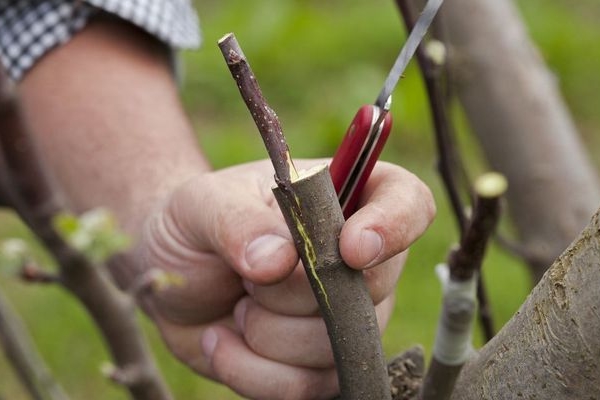To be a good gardener and grow a good crop, you need to know some secrets on the proper care of trees.
To make the trees tasty and prolific, in summer should be budding fruit trees. This is not such a complicated procedure; even a novice gardener will be able to master it.
In this article we will try to reveal the whole technique of grafting trees, as well as the choice of graft.
Table of contents
What is budding
Inoculation is the process of transferring a part from one plant to another, with which it subsequently grows together. You can take root in different ways:
- Budding - grafting vegetative organ - kidney. It is cut from a one-year run with a layer of bark and a small patch of wood.
- Copulation - grafting cuttings. For the procedure used one-year escape with 3-4 buds.
Budding is the easiest to perform.because takes root faster and coalesces better with stock.
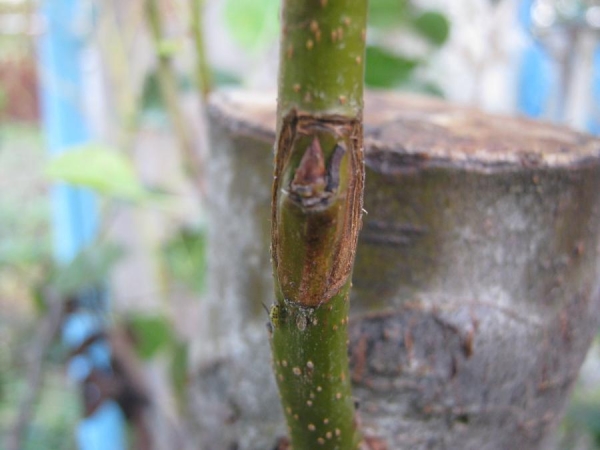
Why you can perform this procedure
Budding is done if there is no tree of the desired variety for sale. It is necessary for:
- increases the frost resistance of the grafted tree;
- makes better and more valuable varieties;
- promotes the rapid emergence of the crop;
- allows you to make those varieties that are needed.
Inoculation time: spring or summer?
The procedure starts in early August.its duration is 4 weeks. The first step is to inoculate stone fruit varieties (cherry, cherry plum), then seed seeds (apple, pear).
Wild and kidney during the procedure should be the desired development. Eyes or buds arising on the shoots should be finally formed.
This can be determined simply: you need to bend the escape, if you hear a crunch. Stocks must develop well so that the bark can be separated.
The procedure is performed before the end of the growing season., summer sometimes.
Budding, carried out earlier, threatens with the fact that until the autumn pores, the cuttings will germinate, and when the first cold appears, they die, and if later - they do not take root.
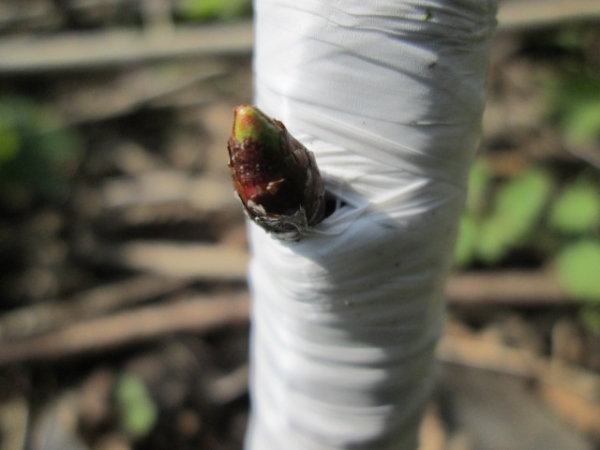
Pros and cons of the method
Like all processes, budding has a number of positive and negative qualities.
Advantages of the method:
- Suitable for breeding different varieties that can not be divided vegetatively.
- Provides more active growth of trees. An example is the euonymus, which grows slowly when seeds are grown.
- Improved branching.
- Cuttings are cut at the fruiting site.
- High breeding rate.
The disadvantages include:
- A big waste of time for care.
- Sometimes there may be a physiological incompatibility.
- Reduces the life of trees. For example, red chestnuts are very sensitive, they cease to grow and gradually die.
- It can worsen the quality of planting material, especially for ornamental plants.
- Slows down growth.
It is important to know that you can not plant evergreen trees.
No matter how it is there, grafting is important for trees, because it is sometimes the only way to breed.
Vaccination kidney:
How to choose the right cuttings for vaccination
The cuttings to be used for grafting, taken from fruit trees of standard species. It is necessary to monitor the internal selection of cuttings for grafting trees.
Choose only healthy strong trees that are more resistant than others.
Eyes and cuttings are not ready for budding at the same time.. They start from the south side of the trunk. The cuttings should be cut at least 15 cm. They should be cut off over 2-3 bud.
The shoots of stone trees should be strong with a length of at least 30 cm. If the shoot is short, numerous buds begin to bloom that are not suitable for grafting.
Important information: process requires fresh cuttings. They need to cut the leaves to retain moisture. Leaf cuttings are saved for easy budding.
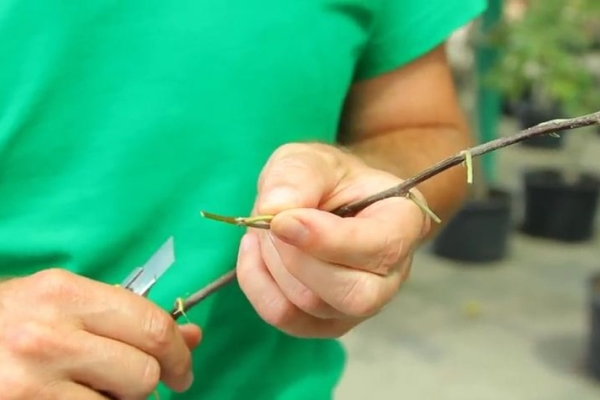
How to plant fruit trees
Inoculation alone is quite difficult, so you need an assistant. One person with a sharp eyebrow blade vaccinates, the other - bandages with a fabric of natural materials - gauze, cotton fabric.
Wicks need to be prepared a week before the procedure: to do this, the ground near the neck of the root must be removed. In parallel, it is necessary to determine the separation of the bark from the wilderness, if it is easy, then you can stick in the bark.
If the separation is bad, then the wilderness needs to be saturated with moisture so that the growth of willows is activated before the procedure, and the cambium is attached, which plays an important role in the separation of the cortex. The eyes can not settle down on the wilderness, from which the bark does not move well.
Before carrying out the procedure, the trunks must be wiped with a wet rag. For budding only need mature eyes. Apical and lower eyes are not used, because they are underdeveloped.
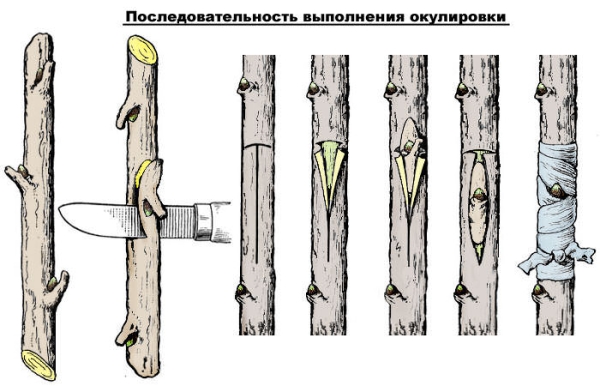
The stalk is cut from the tree along with the bark and wood (cambium and sapwood). They form a shield.
To go flap, a little below the kidney, it is necessary to make an incision of 15-2 cm of the trunk. They begin to cut off the shield 2 cm above the kidney, leading the knife down and grazing the cambium, bark, and sapwood.
The resulting flap cut into the incision of the cortex, and then tied up, closing everything except the eye. Carry out the procedure in windless, not rainy weather.
Important information: a positive result depends on the professionalism of the graftsman, the speed of the budding, the cleanliness and sharpness of the knife, as well as the competent dressing.
The accretion of the cutting with the trunk is fast. Already After 14-18 days, you need to make a check on how the eyes get accustomed.
How to determine survival rate? For this there are a number of distinctive features:
- pale green tinge of the bark of the shield;
- freshness and appearance of the eye;
- easy, quick petiole detachment.
If the eyes did not take rootthey become dull, dry, cease to separate. In the last stage, they shrivel and die.
Once the procedure is over, cultivation must be done to make the soil less dense. For the winter, the wilderness is watered, and the hilling is also carried out so that the eyes do not freeze.
If in the fall eyes start to sproutthen they are connected with a bole and after the appearance of several leaves, they are pinned so that they mature faster.
When earthing up dicks, it is necessary to dust the shoots with earth that appeared from the eyes. In March, you need to do razukochivanie. Already developed shoots are cut off in order to grow a new shoot in the spring.
How easy it is to vaccinate (budding):
Prospects for budding
The outlook for this method is large:
- With the help of it you can form new varieties of trees.
- Budding helps if the plant can not reproduce in standard ways.
- For a short period of time you can get a lot of tasty harvest.
- Grafting is a huge savings in garden space. It is not necessary to plant male and female plants nearby, but only to make a couple of twigs.
- You can make a "tree-garden" - this is the budding of several types of apples or pears on the tree stock. It turns out that at first one variety will grow, then another, the third and now you can feast on different varieties without the hassle.
- There are varieties that require cross-pollination from different varieties for a larger and higher-quality crop. So, if you carry out the budding of several species of cherries per plant, you can significantly increase the yield.
Conclusion
Budding is a good way to make the tree more fertile and healthy.. This is a simple and inexpensive method that any novice gardener can handle.
It is important to learn how to care for the grafted tree, and a tasty harvest is provided for you.The main thing is to choose the right cuttings and attach them well to the tree.
This technique must be learned by any gardener who wants to have his own garden.
Budding for beginners is easy and affordable about tree grafting:
